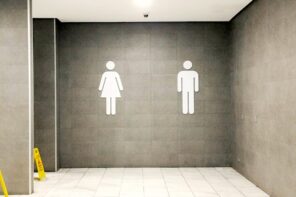The Public Religion Research Institute recently highlighted an important statistic: nearly all Unitarian Universalists (97 percent) support nondiscrimination protections for LGBTQIA+ people. It’s a similar story for reproductive rights—according to the Pew Research Center, 90 percent of Unitarian Universalists (UUs) support keeping abortion legal in all or most cases. When nearly the entirety of a people believes in affirming their LGBTQIA+ neighbors or supporting reproductive justice, these should be taken as central teachings of our faith.
So when we see discriminatory movements across the country to define lifesaving, gender-affirming care for trans youth as “child abuse” or to essentially ban access to reproductive care, we also know that they’re violations of deeply-held UU religious beliefs. Anti-trans laws infringe on our right to support beloved members of our congregations—trans young people and their families—and create a chilling, harmful environment for them.
And anti-choice regulations trespass upon our beliefs in gender equity and support for access to reproductive healthcare. Additionally, they encroach on our commitment to the idea of reproductive justice, which affirms the human right to have children, not to have children, to parent one’s children in healthy environments, to safeguard bodily autonomy, and to express one’s sexuality freely.
These destructive laws challenge religious freedom. They translate the conservative religious beliefs of one group into law, imposing them on everyone else. And they set dangerous precedents that dehumanize and limit the rights of already-vulnerable populations.
Unitarian Universalism is guided by seven principles, the first of which is a belief in the inherent worth and dignity of every person. Our third principle advocates acceptance of one another, guiding our affirmation of LGBTQIA+ individuals, and our second principle promotes justice, equity, and compassion in human relations, underpinning our commitment to reproductive justice. We value diversity of sexuality and gender and see it as a spiritual gift. And we work hard to create inclusive religious communities.
Conservative lawmakers have a history of using the excuse of “religious liberty” to pass discriminatory policies that infringe on others’ freedoms. Texas is an egregious example—Governor Greg Abbott signed a law targeted against adoptions by LGBTQIA+ parents based on religious objections and has cited similar distortions to justify other harmful legislation. In Oklahoma, it’s striking that Governor Kevin Stitt, who recently signed one of the nation’s most restrictive abortion laws in anticipation of the Supreme Court overturning Roe v. Wade, has championed the cause of “religious liberty” when it comes to exempting church congregations from pandemic-era public health and safety measures.
These narrow definitions of religion don’t account for the millions of Americans across various faith traditions who believe in supporting LGBTQIA+ people and the rights of women and pregnant people to access reproductive care as a religious value. “Religious freedom” as originally articulated by the Edict of Torda, an historic declaration of religious freedom and pluralism from which UUs draw our religious lineage, more than 450 years ago served as a protection for minority religious views. And those safeguards are certainly why the Founding Fathers included freedom of religion in the First Amendment.
But currently, the concept of religious freedom is being misused, especially by those on the Right, as an excuse for already powerful and privileged religious movements to exclude, oppress, and circumvent the civil and human rights of people with marginalized identities.
Governor Abbott’s February 22nd directive calls on doctors, nurses, and teachers, to report to child protective services incidences of trans youth receiving gender-affirming care—and reminds them they will face criminal penalties if they don’t. That could criminally implicate UU ministers as licensed professionals since Texas law requires anyone who suspects child abuse to report it, and places both UU church members and clergy in an untenable position. And of course, we’re also aware that Texas has passed an anti-abortion law that encourages ordinary citizens to bring lawsuits against abortion providers, essentially creating bounties, likely meant to foster an atmosphere of fear.
These state-level policies have disturbing national implications. These laws and directives fundamentally violate the religious freedom of our congregations to provide spiritual care to all members.
More importantly, when it comes to transphobic policies, it means families with trans children risk having their children taken from them. I know what it’s like to provide guidance to a family with a transgender child. I did this for a family while a minister in Arizona. I witnessed firsthand the lifesaving difference our inclusive ministry made to this family and their trans daughter. With us, she was able to be fully who she is.
UU congregations are in the business of saving lives, and meeting people with love and welcome. These anti-trans legislative efforts violate our religious freedom and are an affront to all we believe in. Most significantly, they put the lives of trans kids at higher risk for suicide and violence. It’s a moral travesty.
What’s happening in Texas—and this growing trend of oppression—is a threat to freedom everywhere. It is immoral to permit conservatives to redefine “religious liberty” to mean something that protects only the powerful. And it is unconstitutional to allow conservative religious beliefs to dictate issues of justice and equity for all religious communities and society. While faith traditions have the right to their own religious teachings within their communities, in the public square all people deserve to be treated equally. This is fundamental to everyone’s religious freedom in a pluralistic society.
All people of good will must understand the dangerous implications of these efforts, and the harm they create for both our LGBTQIA+ communities and other vulnerable populations—as well as for the freedom of belief and equality we all deserve. As my Unitarian Universalist religion calls me to do, I commit to work even harder to make sure all women, pregnant people, and trans individuals—kids and adults—know that they’re unequivocally and unapologetically valued, and I challenge U.S. lawmakers, and leaders in every part of public life to make that same commitment. I reject dehumanizing, oppressive policies, and I call on the moral conscience of all Americans to reject them, too.





